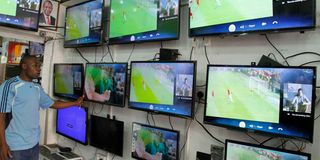Epra plans to regulate TVs, computers on sale

Mr Duncan Ojowi at an electronics shop on Luthuli Avenue, Nairobi. Epra is seeking to regulate TVs, computers and computer monitors to ensure they conform to energy-saving rules.
The energy regulator is now seeking to regulate televisions, computers and computer monitors locally made or imported into the country to ensure they conform to strict energy-saving rules.
The Energy and Petroleum Regulatory Authority (Epra) currently regulates refrigerators, non-ducted air conditioners, three-phase cage induction motors, self-ballasted lamps, double-capped fluorescent lamps and ballasts for fluorescent lamps.
The Energy (Appliances Energy Labelling and Performance) Regulations, 2016 enforce Minimum Energy Performance Standards (MEPS) for these appliances, and mandate Epra to vet them to check their minimum energy performance in a bid to enhance national energy savings.
The Energy (Energy Management) Regulations 2012 also empower Epra to regulate energy efficiency in designated industrial, institutional and commercial facilities.
Models
Since inception of the MEPS programme, Epra has registered 1099 models of household refrigerators, 333 non-ducted air conditioners, 12 motors and 8 self-ballasted lamps models.
In the vetting, Epra uses a five-star labelling scheme where the highest performing appliance has five stars, while the lowest has one star which gives customers information to choose what to buy.
The energy regulator says energy efficiency and conservation will be key to reducing Kenya’s financial, environmental, social and cultural cost of production and wants to amend the law to include more widely used appliances under its scope.
This as Epra seeks to assess the success of the MEPS programme by quantifying energy savings that have been realised to date.
Air conditioners
“This assessment will determine the economic, social, environmental and cultural benefits related to the program that was rolled out in 2016,” said Epra.
“It will also model such potential benefits associated with the plan to include televisions, computer monitors and computers in the current regulations.”
Currently, Epra charges application fees of Sh150,000 for models of lamps and ballasts, Sh250,000 for refrigerators and Sh500,000 for motors and air conditioners.
Epra reckons that energy-efficient appliances will help consumers reduce their energy consumption which will enable energy users to save money amid high costs of electricity.
Electricity prices remain high and last month increased for the third time in four months by 5.2 per cent despite efforts by the government to reduce the prices to lower the cost for households and businesses.





